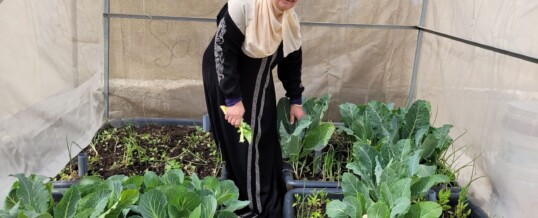
McLeod Group guest blog by Leah Reimer, May 23, 2023
Two billion people, a quarter of the world’s population, live in fragile and conflict-affected states. These people are increasingly vulnerable to the changing climate. Climate change adds new stresses to areas and populations already facing high levels of fragility. For example, by interacting with economic and political contexts, climate change compounds the risks of conflict. Droughts, crop failures, floods and fires can intensify existing tensions or create new ones, when individuals and groups compete for scarce resources such as water and land. Climate disasters are also causing increased forced migration, introducing further potential for conflicts as displaced groups move into new areas.
Similarly, conflict and fragility reduce the capacity of states and communities to adapt to climate change, leaving people vulnerable to even worse outcomes than before. Areas experiencing conflict, especially protracted conflict, often have compromised institutions. Immediate security priorities trump longer-term climate concerns. When climate disasters such as extended droughts arise, communities have less resilience to endure times of crisis.
The intersection of climate change and conflict creates intensified crises. A clear example is the overlapping humanitarian crises occurring in Afghanistan. Extreme climate events, in this case drought and flooding, coupled with decades of conflict, political instability, economic collapse and the return of the Taliban, lead to widespread famine and forced displacement. Likewise, conflicts can create additional vulnerability through marginalization and inequality, as in Palestine and Israel, where access to water and arable land are restricted by both natural and political factors.
This vicious cycle of climate-fragility risks is evident around the world. Many of the countries considered most vulnerable to climate change are also experiencing armed conflict. Despite this heightened vulnerability, states experiencing conflict receive a disproportionately small percentage of international climate funding and programming. Of the 70 most vulnerable countries, 32 received less than US$1 per person for climate adaptation or disaster risk reduction in 2020.
The 2015 Paris Agreement makes clear that climate finance should prioritize the most vulnerable. As climate-related disasters continue to increase in number and intensity, we need to ensure our funding systems respond to complex crises and vulnerabilities. Risk aversion, logistical complications, and sectoral silos contribute to the misalignment of need and climate funding.
Donors tend to be risk-averse. As a result, multilateral climate funds tend to favour large-scale and shovel-ready projects. Providing funding for projects in conflict zones can be politically risky. Practically, working in conflict-affected areas also adds many challenges, such as security concerns, difficulty obtaining essential resources, and rapidly changing contexts.
Further, funding and expertise in the international aid sector are siloed, especially when it comes to climate funding. Development and climate projects, including those funded by Canada, primarily operate in peaceful and stable situations, while peacebuilding and humanitarian aid actors respond to conflict-affected and fragile areas. Most climate adaptation practitioners lack the knowledge, training and capacity to operate in conflict areas.
These challenges leave vulnerable places critically underfunded, despite being the areas that are in greatest need of climate adaptation.
One way to address this need is through funding local organizations. Those best equipped to make effective and informed decisions about what a community needs in order to address climate challenges are the people who live there. Local climate actors are often women, Indigenous leaders, or youth. Other groups can also experience heightened vulnerability through marginalization. Funding adaptation led by local actors and organizations, such as through Canadian funding like Partnering for Climate, addresses some of the root causes of climate vulnerability, including inequality and scarcity, both of which are made worse by conflict.
Funding local climate adaptation projects also provides a pathway for the international donor community to provide effective aid to conflicted areas. In complex or contested political contexts, engaging with local organizations and providing them directly with funding is an effective way to address urgent humanitarian needs, while largely avoiding interaction with governments, especially states that may have weakened political or social cohesion or widespread corruption. Many NGOs are turning to localized responses for climate adaptation.
For example, in Palestine and Israel, along with much of the Middle East, climate change is becoming an increasingly urgent issue. In this already hot and dry part of the world, access to fresh water is becoming a more pressing concern. Mobility restrictions and the risk of violence, combined with the impacts of a changing climate, impede consistent access to water even further for Palestinians. A Mennonite Central Committee (MCC) partner program working in the West Bank and East Jerusalem is addressing these joint dynamics of climate and conflict. It provides families with a small-scale urban agriculture technique, known as wicking beds, which use very little water and space. This program provides much-needed food security to those vulnerable to climate change, in a small-scale and conflict-sensitive way. Climate action and peacebuilding are key priorities of MCC’s work, and they go together. Addressing adaptation needs is a form of proactive conflict prevention and peacebuilding.
As Canada and other donor nations continue to increase their international climate finance contributions, they must consider how to ensure this funding reaches the most vulnerable. Creating and strengthening channels for local climate actors to access funding is a critical tool to achieve this, especially in places affected by conflict.
Leah Reimer is an Advocacy Research Intern with the Peace and Justice Office, Mennonite Central Committee Canada. She is a recent graduate of Simon Fraser University, where she earned a Bachelor of International Studies. Image: Fatima Al Takatka tends the cauliflower and herbs she is growing in her rooftop wicking garden boxes introduced by MCC partner Applied Research Institute-Jerusalem (ARIJ). She is a participant in a wicking garden project which has enabled her to grow vegetables that she would not be able to afford otherwise. Photo credit: MCC/Melita Rempel-Burkholder.
